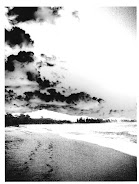By Patrick Cockburn
(Taken from The Independent Online Edition)
Published: 04 September 2007
He said that, judging by what he had been told by US commander General David Petraeus and ambassador Ryan Crocker, "it will be possible to maintain the same level of security with fewer American forces."
Mr Bush chose to visit Anbar because the split between the Sunni tribes and al-Qai'da in Iraq has led to a sharp reduction in attacks on US forces in this vast western province which is mostly desert aside from the Euphrates valley.
The administration has had some success in persuading US public opinion and media that the military escalation known as "the surge" which started in February is having a measure of success. Gen Petraeus and Mr Crocker are to report on the impact of "the surge" when they testify to Congress on 10 September. Since they will be reporting on their own efforts it is likely they will report significant progress.
The reduction in American troop numbers Mr Bush suggested is probably inevitable given the strain Iraq is placing on American military resources and the public pressure domestically.
Mr Bush flew secretly to al-Asad airbase in Anbar where he met the Iraqi prime minister Nouri al-Maliki whose government has been criticised by the Democrats in the US and half of whose ministers have been withdrawn.
Addressing cheering troops, Mr Bush insisted troop withdrawal would be based on a "calm assessment by military commanders on the ground not a nervous reaction by Washington politicians to poll results in the media".
But he said that the province was an example of what could happen in the rest of Iraq. He had been told a year ago, he said, that the province was lost. "Today Anbar is really a different place," he said.
In reality, the improvement in the US position in Anbar has nothing to do with the surge and the deployment of 30,000 extra American troops. The change in the military situation in the province is a result of a split in the Sunni guerrilla movement between an al-Qa'ida umbrella organization called the Islamic State of Iraq and the rest of the Sunni guerrillas.
The Islamic State of Iraq created widespread anger among the Sunni community by killing anybody connected with the government, such as garbage collectors or lowly employees of ministries. They were also seeking to draft one young man from each Sunni family into their forces.
Bizarrely, the US is now backing and arming Sunni tribal militias who do not answer to the Iraqi government, while pressing Mr Maliki to clamp down on the Shia militias, notably the anti-American Mehdi Army led by Muqtada al-Sadr.
President Bush may be giving a hostage to fortune by claiming a major success in Anbar because, since the improvement in the military situation had little to do with the US, the Sunni guerrillas could compose their differences and resume the offensive.
The administration has been seeking to give the impression that the US military may at last be turning the corner in Iraq, though Iraqi politicians in Baghdad believe very little has changed on the ground.
One sign that Iraqis themselves believe security in the country is getting worse is that the number of Iraqis fleeing their homes in fear of their lives has risen from 50,000 a month to 60,000 a month according to the UN High Commission for Refugees. Some 4.2 million Iraqis are now refugees inside and outside the country.
Although the US has been pressing the Iraqi government to push through parliament a series of benchmark measures that would supposedly lead to reconciliation between Sunni, Shia and Kurd the different Iraqi communities are too frightened of each other to live in the same street or village.
There are other signs that violence in Iraq is not lessening. Figures compiled by AP show 1,809 Iraqi civilians were killed in August, compared with 1,760 in July. There has been a reduction in sectarian killings in Baghdad but that may be because Mr Sadr stood down the Mehdi Army, blamed for many of the killings of Sunni civilians, in February.
The number of US military killed was 81 in August, an increase of two over July but less than this year's high point of 126 in May. There is usually reduction in attacks on the US forces at this time of year when the temperature soars to 120F.
The whole question of civilian casualty figures is, in any case, far less certain than the Iraqi government claims. In one bomb attack on the Shia civilian district of Karada on 26 July the police said there were 25 dead and 100 wounded. But a week later, without any publicity, municipal andcivil defence workers pinned up the true list on a shop showing 92 had been killed and 127 wounded.
Patrick Cockburn es un periodista irlandés que ha sido corresponsal en el Medio Oriente desde 1979 para el Financial Times y The Independent. Actualmente, se encuentra en Irak como corresponsal de The Independent.



